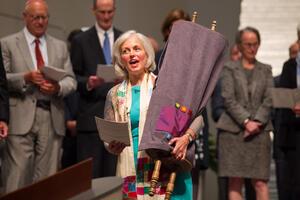Elaine Zecher
Rabbi Elaine Zecher uses her own experiences of illness and struggle to counsel congregants and craft prayers for Mishkan T’fillah and Mishkan HaNefesh, the prayer books of the Reform Movement. Zecher graduated from Brandeis University in 1983 and was ordained by Hebrew Union College – Jewish Institute of Religion in 1988. She briefly served as program director for the Striar JCC in Stoughton, Massachusetts before becoming the first woman rabbi of Temple Israel in Boston in 1990. In another first for the congregation, she was promoted to senior rabbi of Temple Israel in 2016. During her years as a congregational rabbi, Zecher struggled with breast cancer, an experience that led her to create new rituals to mark illness and healing. Beyond her congregational work, Zecher has held numerous roles within the Central Conference of American Rabbis (CCAR), the professional organization of Reform rabbis, including vice president for leadership and chair of the Worship and Practices Committee. She also helped shape the CCAR’s weekly prayer book, chaired their Machzor Advisory Group as they revised their High Holiday prayer book, and helped run Synagogue 3000, a program to help synagogues find new ways to connect to congregants emotionally and spiritually.
Elaine Zecher, senior rabbi of Temple Israel of Boston, discusses her upbringing, position, and faith in an interview with Ronda Spinak. Zecher touches upon her initial skepticism toward congregation work, believing that there was little room for change or adaptation. Citing a session by the Women’s Rabbinic Network as inspiration, she realized that she would have to act as an agent of change and applied to Temple Israel when a position opened. She goes on to discuss her family, including her sister, a fellow rabbi, who first advised her to take rabbinical classes. As the first woman rabbi at Temple Israel, she reflects on her experiences as a woman in both rabbinical school and her position at the temple, including her experiences while pregnant. Zecher goes on to discuss her mission for her rabbinate, a concept she describes as the world of the spirit, citing Joshua Loth Liebman and Martin Buber as inspiration. She reflects on her love for liturgy and how this has built up her work on Mishkan T'filah, the Reform Movement’s new prayer book, and on Mishkan HaNefesh, the Reform Movement’s Machzor. She continues by reflecting on how she nurtures her own soul and her involvement with the Institute for Jewish Spirituality. Zecher talks about Temple Israel’s work with AIDS victims in the 80s, emphasizing the temple’s healing services. Despite her initial skepticism in congressional work, she found her formation of a Womens' Kallah at Temple Israel to be a major step in liturgical and ritual change. She explores her conception of integrated theology, an idea she discusses which integrates different embodiments of G-d, and her Doctor of Divinity. She ends the interview emphasizing the role of the synagogue in her journey and her love for the universal values of Judaism.



